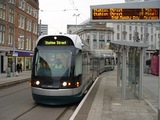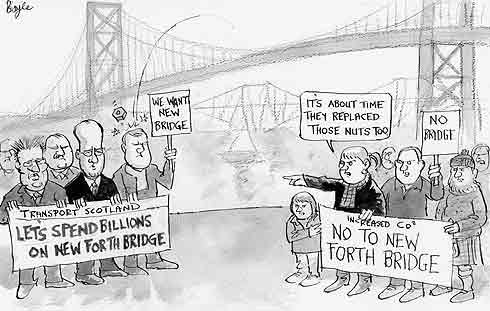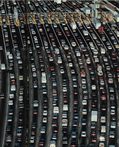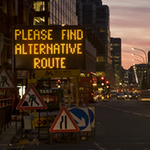
It's satisfying, commissioning opinion polls, especially on topics where the other side is rich and powerful but hasn't published any poll results. That always makes me suspect our position is popular as well as right.
The one we released today (thanks to Friends of the Earth Scotland and the ForthRight Alliance for co-commissioning it) covered Ministers' plans for a new Forth Road Bridge.
But is that the real choice that Ministers face? Could they definitely repair the existing bridge? There are two ways it could be delivered. First, the Forth Estuary Transport Authority are highly confident that the dehumidification of the cables will work. It's underway, and it's
costing £10.3m, which is pocket change in bridge terms.
To give the SNP the maximum benefit of the doubt, though, let's assume that that dehumidification fails. We'd then have to go to recabling or cable augmentation. There are three variants of this approach: replacement above, augmentation above, and augmentation to the side. Any of these would simply work, guaranteed: it's a
standard operation, with lots of
international expertise available.
A report from FETA in February 2008 showed that this would cost between £91m and £122m, depending on the option chosen. Perhaps by coincidence, FETA just got a shiny new website and the report is no longer available. I'm not saying it's a deliberate whitewashing, mind: as I've recently been reminded, sufficiently advanced incompetence is indistinguishable from malice. You can see the Google cache of the report
here.
So £122m is the top end for fixing the bridge, and that's what YouGov offered as one option. The other, again giving the SNP's spin machine the benefit of the doubt, is their current upper estimate for an entirely new bridge -
£2,300m.
Despite the constant deluge of spin, by almost two to one the public just don't think that's a sensible choice. To sum up, the new bridge would be:
Unaffordable. Scottish Ministers don't have the money. They begged Westminster for it, and sensibly, got
knocked back. John Swinney and colleagues ceaselessly complain about "
£500m of Labour cuts", yet they're planning to blow more than four times that on this structure.
Unsustainable. It's just more road capacity. Labour argued for a "multimodal" bridge, with rail or light rapid transit built in as well as a road route, but the SNP didn't listen. The existing bridge, magically repaired despite all the Ministerial bluster, will supposedly be reserved for buses and taxis, but no-one believes that. As drivers sit in jams on the new bridge and look downstream to the probably empty old bridge, they'll understandably get a bit miffed. If there's one constant since 1999, it's Ministers doing whatever the motoring lobby want, and that reservation for public transport will melt like snow off a dyke.
As a result, there'll be four lanes of traffic feeding into Edinburgh, and congestion levels will inevitably worsen alongside carbon emissions. This ignores the opportunity cost, too - if the same money were spent on public transport, the SNP could be cutting emissions and congestion rather than worsening them.
Unnecessary. There's no argument against simply fixing the existing bridge, apart from the unsubstantiated handwaving about economic impact. The real reason it's being pushed for so hard is two-fold. First, there's a misconception that people in Fife vote for whoever promises them more bridges. Second, Alex Salmond loves his hard hat openings, and who knows, the bridge may even end up being named after him. I look forward to watching the Labour leader's face if that happens.
Unpopular. Our poll had crossbreaks by voting intention, and every party's voters are against it. The closest you come to sympathetic is amongst SNP voters, but even they aren't convinced by John Swinney's arguments. In these times of budget pressure, Tory and Labour voters are the most sceptical, as you might expect, but there's not much in it.
Going by the constituency vote, here's the specific extent to which all the other parties are out of touch with their supporters:
Conservative » Repair: 64%, Replace: 30%, Don't Know: 6%
Labour » Repair: 59%, Replace: 32%, Don't Know: 9%
Lib Dem » Repair: 56%, Replace: 37%, Don't Know: 7%
SNP » Repair: 51%, Replace: 41%, Don't Know: 9%
Bad politics. Public transport projects across the country are getting put on hold, with
GARL just the most obvious example. When the budget and the timescale get blown, and when Fife and the Lothians are snarled up in congestion, the new bridge will plumb depths of unpopularity that will make my time on the Parliament building project look like a walk in Holyrood Park.
Right now there are four opposition parties, and just one, the Greens, arguing against this scheme. I keep expecting one of the other parties to get the arguments against and join us to campaign for repair instead of replacement. Whoever does so can clearly reap a massive political reward, a reputation for prudence, and some pretty substantial environmental credentials.
The alternative is for it to be just us holding the SNP to account while the others go down with them, and while we have to watch the bridge eating a decade's worth of discretionary capital spend. Who's with us?
 Last year we commissioned polling that showed 57% of Scots wanted to repair the existing Forth Road Bridge, not build a new one, with just 34% in favour of the SNP plans.
Last year we commissioned polling that showed 57% of Scots wanted to repair the existing Forth Road Bridge, not build a new one, with just 34% in favour of the SNP plans. 






















